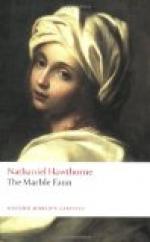“I dare not linger upon it,” answered Donatello, with an expression that reminded the sculptor of the gloomiest days of his remorse at Monte Beni. “I dare to be so happy as you have seen me, only because I have felt the time to be so brief.”
“One day, then!” pleaded Miriam. “One more day in the wild freedom of this sweet-scented air.”
“Well, one more day,” said Donatello, smiling; and his smile touched Kenyon with a pathos beyond words, there being gayety and sadness both melted into it; “but here is Hilda’s friend, and our own. Comfort him, at least, and set his heart at rest, since you have it partly in your power.”
“Ah, surely he might endure his pangs a little longer!” cried Miriam, turning to Kenyon with a tricksy, fitful kind of mirth, that served to hide some solemn necessity, too sad and serious to be looked at in its naked aspect. “You love us both, I think, and will be content to suffer for our sakes, one other day. Do I ask too much?”
“Tell me of Hilda,” replied the sculptor; “tell me only that she is safe, and keep back what else you will.”
“Hilda is safe,” said Miriam. “There is a Providence purposely for Hilda, as I remember to have told you long ago. But a great trouble—an evil deed, let us acknowledge it has spread out its dark branches so widely, that the shadow falls on innocence as well as guilt. There was one slight link that connected your sweet Hilda with a crime which it was her unhappy fortune to witness, but of which I need not say she was as guiltless as the angels that looked out of heaven, and saw it too. No matter, now, what the consequence has been. You shall have your lost Hilda back, and—who knows?—perhaps tenderer than she was.”
“But when will she return?” persisted the sculptor; “tell me the when, and where, and how!”
“A little patience. Do not press me so,” said Miriam; and again Kenyon was struck by the sprite-like, fitful characteristic of her manner, and a sort of hysteric gayety, which seemed to be a will-o’-the-wisp from a sorrow stagnant at her heart. “You have more time to spare than I. First, listen to something that I have to tell. We will talk of Hilda by and by.”
Then Miriam spoke of her own life, and told facts that threw a gleam of light over many things which had perplexed the sculptor in all his previous knowledge of her. She described herself as springing from English parentage, on the mother’s side, but with a vein, likewise, of Jewish blood; yet connected, through her father, with one of those few princely families of Southern Italy, which still retain great wealth and influence. And she revealed a name at which her auditor started and grew pale; for it was one that, only a few years before, had been familiar to the world in connection with a mysterious and terrible event. The reader, if he think it worth while to recall some of the strange incidents which have been talked of, and forgotten, within no long time past, will remember Miriam’s name.




